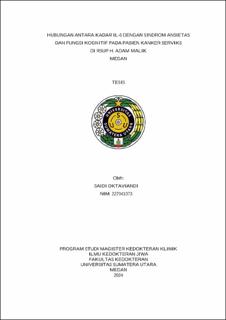| dc.contributor.advisor | Effendy, Elmeida | |
| dc.contributor.advisor | Husada, M Surya | |
| dc.contributor.author | Oktaviandi, Saidi | |
| dc.date.accessioned | 2024-08-26T07:05:53Z | |
| dc.date.available | 2024-08-26T07:05:53Z | |
| dc.date.issued | 2024 | |
| dc.identifier.uri | https://repositori.usu.ac.id/handle/123456789/96087 | |
| dc.description.abstract | Background: Data from the Global Cancer Observatory (GLOBOCAN) shows that cervical cancer is the most common type of genital cancer in women worldwide, with an estimated 604,000 new cases in 2020. Cervical cancer also impacts the mental well-being of patients, with high rates of mental disorders such as depression and anxiety, as well as neurocognitive issues that can affect quality of life. Previous studies have shown that IL-6 levels correlate with anxiety syndrome and cognitive function in cervical cancer patients. This study aims to examine this relationship at H. Adam Malik Hospital Medan. Methods: This research is a correlative analytic study with a cross-sectional study approach. The sampling technique in this study used non probability sampling technique type consecutive sampling with a total sample of 91 cervical cancer patients at H. Adam Malik Hospital Medan. The study used the Generalized Anxiety Disorder-7 (GAD-7) questionnaire and the Montreal Cognitive Assessment (MoCA) to measure anxiety symptoms and cognitive function. Results: The age variable in respondents had a median of 37 years (range 31-65 years). The majority of respondents did not work (69.2%) and had elementary to high school education (91.2%). The median GAD-7 score was 13 (range 4-19), MoCA-Ina was 27 (range 22-30), and IL-6 levels were 2.84 (range 0.15-7.67). There was a weak positive association between IL-6 levels and anxiety syndrome in cervical cancer patients. However, there was no association between MoCA-Ina score and anxiety syndrome in cervical cancer patients. Conclusion: This study showed a significant association between IL-6 levels and anxiety syndrome in cervical cancer patients. The implications of these findings can be used to develop more effective treatment strategies in the management of anxiety and maintenance of cognitive function in cervical cancer patients. | en_US |
| dc.language.iso | id | en_US |
| dc.publisher | Universitas Sumatera Utara | en_US |
| dc.subject | Cervical Cancer | en_US |
| dc.subject | Anxiety | en_US |
| dc.subject | Cognitive Function | en_US |
| dc.subject | IL-6 Levels | en_US |
| dc.subject | Patients | en_US |
| dc.subject | SDGs | en_US |
| dc.title | Hubungan antara Kadar IL-6 dengan Sindrom Ansietas dan Fungsi Kognitif pada Pasien Kanker Serviks di RSUP H Adam Malik Medan | en_US |
| dc.title.alternative | The Relationship between IL-6 Levels with Anxiety Syndrome and Cognitive Function in Cervical Cancer Patients at RSUP H Adam Malik Medan | en_US |
| dc.type | Thesis | en_US |
| dc.identifier.nim | NIM227041073 | |
| dc.identifier.nidn | NIDN0001057202 | |
| dc.identifier.nidn | NIDN0003028003 | |
| dc.identifier.kodeprodi | KODEPRODI11103#Ilmu Kedokteran Klinis | |
| dc.description.pages | 97 Pages | en_US |
| dc.description.type | Tesis Magister | en_US |


